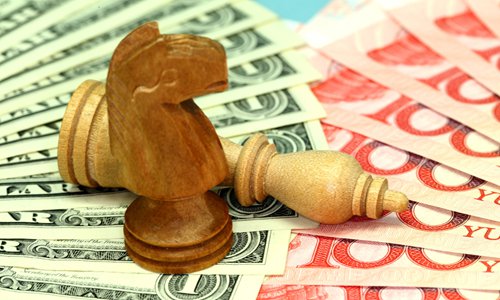HOME >> BUSINESS
‘Currency manipulation’ accusation latest weapon in US arsenal against China
By Li Qiaoyi and Wang Yi Source:Global Times Published: 2019/8/6 14:05:45

Photo: VCG
Following US President Donald Trump's reckless steps creating global trade and finance chaos, the US Treasury moved to name China as a "currency manipulator" on Monday, in a move denounced by Chinese economists as utterly groundless and hegemonic.
The unwarranted accusation, made after the yuan weakened past a key mark of 7 against the greenback, was to set the stage for the US to brandish its tariffs weapon, they said on Tuesday.
A few hours after Trump tweeted, "China dropped the price of their currency to an almost historic low. It's called 'currency manipulation,'" earlier on Monday, Treasury Secretary Steven Mnuchin, under the auspices of Trump, announced the currency manipulation designation in a statement on the Treasury's website.
Mnuchin will engage with the IMF to "eliminate the unfair competitive advantage created by China's latest actions," according to the statement. The IMF has yet to publicly comment on the situation.
"Labeling another country as a currency manipulator is unjustified. The US doesn't have the right to make such a labeling wantonly," said Dong Shaopeng, an adviser for the China Securities Regulatory Commission.
The US has been using this to disrupt China's economy and financial system since 2004. "It's a groundless frame-up and pure bullying act," Dong said.
The US Treasury statement cited a portion of a post by China's central bank on the same day to substantiate its allegation that China is experienced in manipulating its currency.
The portion it quoted narrates the central bank's push for continued innovation and the enrichment of China's policy toolbox to fight against short-term speculative bets and stabilize market expectations, which was nonetheless claimed by the US Treasury to be an open acknowledgement of the central bank's currency manipulating moves.
The statement by the People's Bank of China, China's central bank, highlights its belief that the yuan, which weakened past 7 due to multiple factors including market expectations of the US imposition of tariffs on Chinese products, will be kept basically stable at a reasonable and equilibrium level.
Both onshore and offshore yuan breached the 7 mark against the US dollar for the first time in more than a decade on Monday. The yuan's weakness continued into Tuesday.
A separate statement by PBC governor Yi Gang on Monday said China will not resort to yuan depreciation for competitive purposes, nor will it use currency as a tool to deal with external disturbances such as the trade conflict. The nation will stick to a market-determined foreign exchange-rate system, according to Yi.
"The US labels China as a currency manipulator on Monday because China's central bank didn't intervene and defend China's currency, how interesting!" Mei Xinyu, a veteran analyst close to the Ministry of Commerce, told the Global Times.
Most absurdly, the latest move couldn't hold water even by the US' own rules, analysts noted.
Per the Treasury's most recent report in May concerning the foreign exchange polices of its major trading partners, its criteria to judge whether its trading partners amount to currency manipulation include a material current account surplus, which has been lowered to 2 percent of GDP from the previous 3 percent. China's current account surplus stood at about 1.55 percent of its GDP for the first quarter of the year, lower than the ratcheted-down number, according to Wu Jinduo, head of fixed income at the research institute of Great Wall Securities, citing data from China's foreign exchange regulator.
The criterion, essentially subjective and vague, has turned out to be another US weapon alongside trade tariffs threats, but the accusation appears to be failing, Wu told the Global Times Tuesday.
Apparently, as Chinese experts pointed out, the US intends to add currency manipulation designation to its trade war ammunition.
This is the US' latest pressure-tactic move in the ongoing trade talks, which gives the US new excuses to impose more tariffs or other sanctioning steps on China, Tan Xiaofen, deputy head at the School of Finance at the Central University of Finance and Economics, told the Global Times on Tuesday. "The US has extended the trade war to the financial and currency sector," Tan said.
The ultimate purpose of the US' latest drastic action is to maximize the impacts of its tariffs on China's economy. It's the US' new means in the escalating trade war between the two largest economies, said Sang Baichuan, director of the Institute of International Business at the University of International Business and Economics.
Global financial markets have taken a hit from the US' unruly moves. Stock markets across the Pacific recorded big losses. The Dow lost nearly 800 points to close below 26,000 points on Monday.
"Over the short term, the global market would be mired in panics about an extension of the trade war into a currency war," Wu said, adding that the market would gradually calm down although yields are set to be in decline and fluctuations would grow.
China, for its part, is advised not to overreact, she believes, noting the nation should continue on its reform path.
If the US perceives the depreciation as China's "manipulation," and expects to magnify the impacts of its tariffs through yuan appreciation, its moves would end up being self-defeating, Sang said.
"The US is the only super-power and core country of the international currency system. When a major economic crisis and expectation is formed, international capital will flow to the US dollar, pushing up its exchange rate," Mei said.
Posted in: MARKETS,BIZ FOCUS